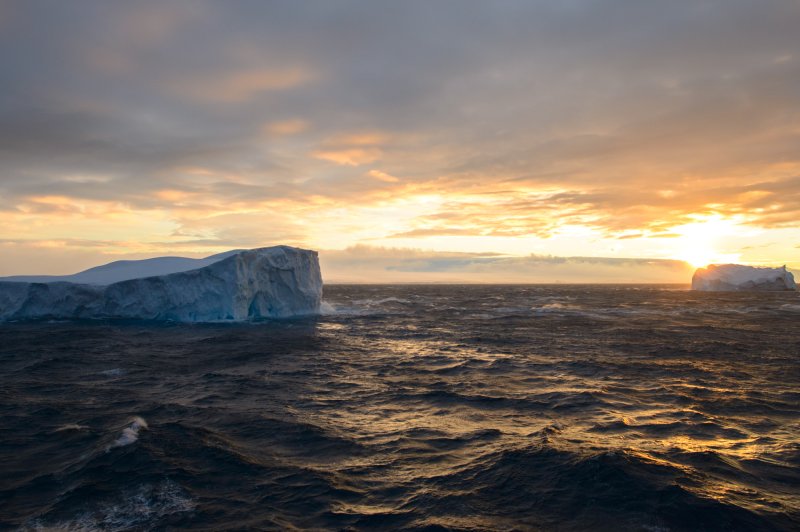Ocean currents around Antarctica are speeding up due to climate change, according to a new study. Photo by Reeve Jolliffe/
Flickr/NASA
Nov. 29 (UPI) -- Climate change is speeding up the ocean currents around Antarctica, an analysis published Monday by the journal Nature Climate Change found.
Prevailing westerly winds have fueled this increase in velocity, as the climate around the South Pole region warms, the researchers said.
Models developed by the team -- from the Scripps Institution of Oceanography at the University of California, San Diego, Woods Hole Oceanographic Institution, the Chinese Academy of Sciences and the University of California, Riverside -- show that rising winds energize ocean eddies.
Eddies are circular movements of water that run counter to main currents, causing them to flow faster, according to the researchers.
"From both observations and models, we find that the ocean heat change is causing the significant ocean current acceleration detected during recent decades," co-author Jia-Rui Shi said in a press release.
"This speed-up ... facilitates property exchange, such as of heat or carbon, between ocean basins and creates the opportunity for these properties to increase in subsurface subtropical regions," said Shi, a post-doctoral researcher at Woods Hole Oceanographic Institution in Massachusetts.
The Antarctic Circumpolar Current is already among the world's strongest ocean currents and it is the only one that circumnavigates the planet, according to the researchers.
It encircles Antarctica and separates cold water in the south from warmer subtropical water just to its north.
This warmer part of the Southern Ocean takes up a lot of the heat that human activities are adding to Earth's atmosphere, the researchers said.
As a result, it could influence climate elsewhere on the planet, according to the researchers.
The ocean warming pattern is important because when the gradient, or amount of heat difference, between warm and cold waters increases, currents between those two masses speed up.
Previous research has shown that these ocean currents are particularly sensitive to wind conditions.
For this study, they used satellite measurements of sea-surface height and data collected by the global network of ocean floats called Argo to detect a trend in Southern Ocean upper layer velocity previously unknown.
The Argo network of autonomous floats, which measure ocean conditions such as temperature and salinity, began in 1999 and reached full capacity in 2007, the researchers said.
A full complement of 4,000 floats across the world's oceans continues to collect data, meaning they were able to use more than a decade's worth of comprehensive information to identify the trend of the accelerating current from natural variability.
It is likely that the speed of the current will increase even more as the Southern Ocean continues to take up heat from human-induced global warming, according to the researchers.
"The Antarctic Circumpolar Current is mostly driven by wind," co-author Lynne Talley said in a press release.
However, "we show that changes in its speed are surprisingly mostly due to changes in the heat gradient," said Talley, a physical oceanographer at Scripps Oceanography.















